A critical geopolitics transformed by the Covid-19 pandemic
DOI:
https://doi.org/10.15381/espiral.v2i4.19529Keywords:
Covid-19, Critical Geopolitics, Latin America, Challenges, Nation StateAbstract
COVID-19 showed, without precedent, a health, economic, political and environmental crisis, around which space-time was compressed from a simultaneity creating a global and systemic “we”; the pandemic is lived in real time globally connected, and paradoxically, fragmented by national histories of inequality and social and environmental injustice. The magnitude of the COVID-19, takes the role of detonator of a new geopolitics that radically disrupts the world order, that reinforces the national state as pivot of the “governmentality” and that resignifies the local powers, particularly the corporal sphere, of subjective and intersubjective feelings and emotions. Where uncertainty and chaos are debated between the old that dies and the living that replaces it, we are before the (re)emergence of geopolitical imaginaries that update that famous slogan “Another world [of universalist particularisms, better than the current one] is possible”.

Downloads
Published
Issue
Section
License
Copyright (c) 2021 Jaime Antonio Preciado Coronado

This work is licensed under a Creative Commons Attribution-NonCommercial-ShareAlike 4.0 International License.
LOS AUTORES RETIENEN SUS DERECHOS:
a. Los autores retienen sus derechos de marca y patente, y también sobre cualquier proceso o procedimiento descrito en el artículo.
b. Los autores retienen el derecho de compartir, copiar, distribuir, ejecutar y comunicar públicamente el artículo publicado en la revista Espiral (por ejemplo, colocarlo en un repositorio institucional o publicarlo en un libro), con un reconocimiento de su publicación inicial en la revista Espiral.
c. Los autores retienen el derecho a hacer una posterior publicación de su trabajo, de utilizar el artículo o cualquier parte de aquel (por ejemplo: una compilación de sus trabajos, notas para conferencias, tesis, o para un libro), siempre que indiquen la fuente de publicación (autores del trabajo, revista, volumen, número y fecha).





